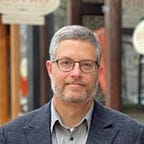A New Firm for a New Normal
Please say hello to Broad Ripple Strategies, a new consulting firm I’m launching with my former Market Street Services colleague, Matt DeVeau.
Together we’ve spent nearly 30 years in the economic development strategy field working to help communities of all sizes develop and execute plans to improve job creation, talent capacity, and quality of life and place. All told we’ve managed over 90 processes for cities, regions, states, and provinces in the U.S. and Canada.
Accumulated lessons and experiences from these engagements evolved a shared philosophy that led us to join forces and apply our knowledge in the service of positive community change. This philosophy is rooted in the observed understanding of how places approach strategic development and implementation. Our core belief — that impactful strategies cause broad ripples throughout the community — informed our company’s name and the process we promote.
It’s important to note that high impact doesn’t always equate to high dollar. Some of the most far-reaching and transformative projects aren’t the mega-developments with seven-figure price tags but the bold initiatives that take a community outside its comfort zone and challenge status quo thinking.
Every community brings unique assets to the table; some have greater implementation capacity, some have more cohesive and united leadership, some have better name recognition or geographic advantages. But in every place we’ve worked — big or small, thriving or struggling — a group of committed individuals was passionate about the area and excited for its future. Their core belief in the community’s possibilities is what keeps us motivated to do the work — what makes it personal. People care about these strategies and that raises the stakes.
My most frequent client community throughout my career has been Austin, Texas. It was my first project as an economic development consultant in 2003 and a repeat client five more times through new strategies and mid-course adjustments.
In 2003 Austin was in trouble; the bursting of the dotcom “bubble” reversed positive population and income trends for the first time in a generation. A half-completed office shell in Downtown Austin — abandoned due to lack of funding — was a visual metaphor for the challenges the region was facing. Fast-forward to 2021 and metro Austin has been the nation’s top-performing region for well over a decade, now facing the demands of accommodating this sustained and dynamic growth.
When people (clients or otherwise) find out about my experience in Austin, they inevitably ask, “How did they do it and how can we do it here?” The same is true of my multi-engagement experience with Greater Des Moines, another star economic development performer.
The reality is that all the strategy in the world won’t get you the University of Texas or Austin’s natural amenities or Des Moines’ visionary, foundational insurance companies. What both regions have done is leveraged their assets and enhanced their competitive positions through smart investments, aspirational projects, and staying true to their community cultures. Not everyone wants to Keep Austin Weird, but top leadership understands that a weird Austin is good for business. Even as Austin transforms into a globally recognized metro, there’s still a distinctiveness that makes it a talent-friendly destination.
During a five-year stint living in Des Moines while my wife attended medical school, I had the privilege of managing the region’s Capital Crossroads process to develop an ambitious vision plan for Central Iowa. I heard first hand how the community fought to keep its big companies at home, even after they were acquired, and the subsequent expectation that corporate executives give back to the community.
I grew to understand how the dissonance between the region’s dynamic quality of life and — as one leader told me — external perceptions of Des Moines as a land of “corn and cows” could motivate community boosters to invest in projects and promotion that would change that narrative.
As a result, the region has long invested big in quality of life and place amenities, well before it was the thing to do. Now they can proudly call themselves a “30 year overnight success story” as the Des Moines metro leads the Midwest in population growth and makes just about every Top 10 list for best places.
That combination — ambition and a strong culture of leadership — is the secret sauce that allows communities to aim high and hit their target. At Broad Ripple Strategies, our goal is to translate that ambition into actionable projects advanced through implementation processes that leverage and cultivate strong leaders in the service of community empowerment and improvement.
We’re not reinventing the wheel but like to think we’ll help communities improve their steering.
Matt and I invite you to check out our website and keep an eye out for social media feeds and regular posts on economic, community, and talent related trends that impact how places compete.
We’re just starting out as a firm but have been around this industry for years. We’re excited to see old friends and partner with new communities as we launch our brand and put our philosophy into action.
Be well and hope to see you soon.
